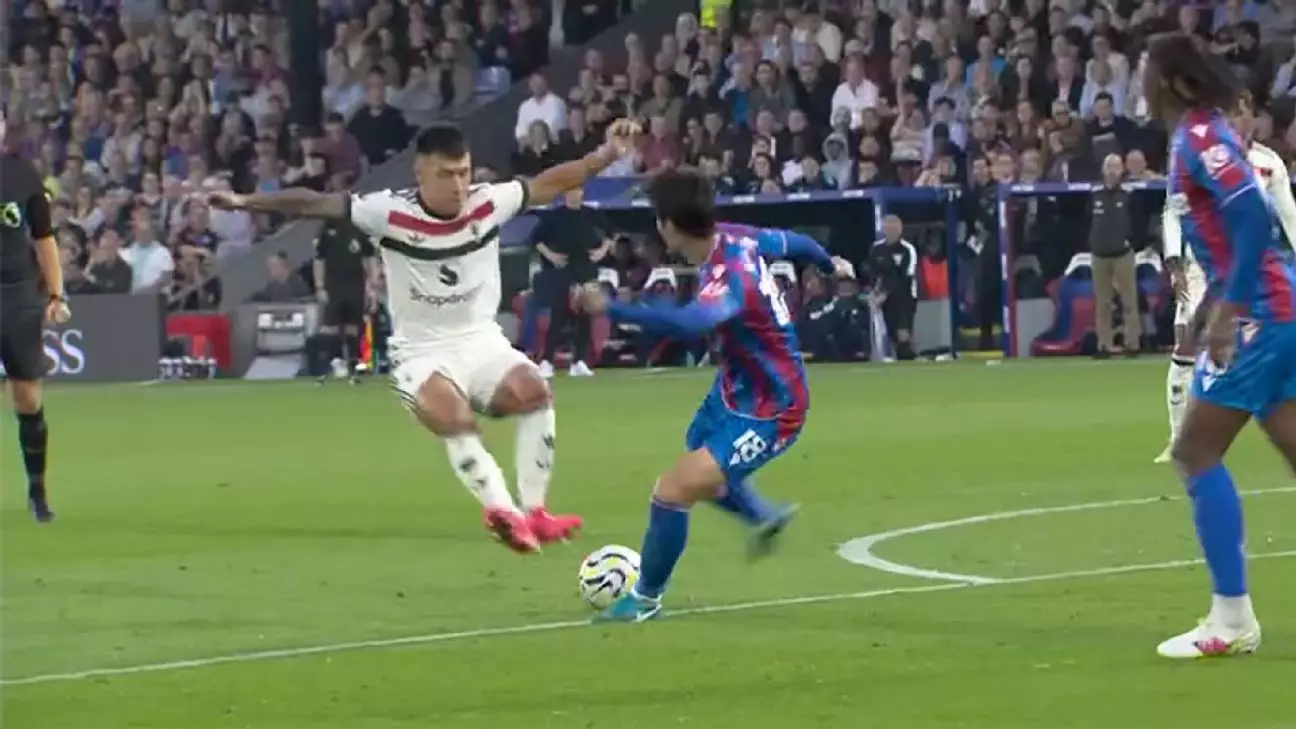The Premier League has often found itself at the center of contentious discussions regarding officiating decisions. At times, these debates underscore the complexity of applying rules consistently. The most recent round of assessments by the Independent Key Match Incidents (KMI) Panel illustrates this complexity, highlighting both the blistering pace of modern football and the equally rapid scrutiny that follows every controversial incident.
In a highly scrutinized match against Crystal Palace, Manchester United’s Lisandro Martínez committed a challenge that caught the attention of spectators and officials alike. Referee David Coote opted to only issue a yellow card for Martínez’s tackle on Daichi Kamada. This decision underwent detailed review by the VAR, Chris Kavanagh, who decided not to send Coote to the monitor—a choice that now raises questions about the consistency and transparency of officiating standards.
UEFA’s guidance, which is adhered to by the Professional Game Match Officials Limited (PGMOL) and the Premier League, states that if no contact is made, a yellow card suffices. Though Martínez leapt into the challenge, which could be deemed reckless by the eye of the beholder, the absence of contact with Kamada led to the panel’s support for the initial ruling. This brings to light an inherent tension: while guidelines are in place, the spirit of the game often dictates a different course of action.
Interestingly, the KMI Panel acknowledged the absurdity of Martinez’s action when viewed in isolation. Describing it as a “ridiculous challenge,” they noted that Martinez was fortunate not to have made contact with Kamada. Such a perspective emphasizes that foul play, albeit unpunished in this instance, can still undermine the integrity of the sport.
In another match that drew attention, Arsenal’s Leandro Trossard received a second yellow card during the 2-2 draw against Manchester City for delaying the restart. The decision was upheld by a 4-1 vote, indicating a general consensus among the panel regarding the appropriateness of the referee’s decision. This provides a glimpse into how tactical infringements, particularly those designed to disrupt the flow of the game, are scrutinized and penalized in modern football.
Contrasting this, the panel observed an incident involving Nottingham Forest’s Morgan Gibbs-White, where the majority opinion suggested that while the challenge was forceful, it did not reach the threshold for a second caution. This split vote highlights the subjective nature of officiating—the very essence of human error mixed with varied perceptions of what constitutes a dangerous challenge.
Among the most controversial elements in officiating today is the Video Assistant Referee (VAR) system, which is meant to correct significant errors made on the field. In the match between Brighton & Hove Albion and Nottingham Forest, a clear divide emerged between what the panel deemed a significant caution versus a reckless challenge. The use of VAR in this context underscores the challenges of defining thresholds for intervention.
This divides not only opinions on match days but can also create frustration among fans and administrators alike. With only one VAR decision deemed incorrect this season thus far, one could argue that the technology is making strides in improving accuracy. Nevertheless, the continued discussion about overlooked incidents—such as the penalty denial to West Ham United—suggests that while VAR seeks to improve oversight, its implementation is still far from flawless.
Amidst the challenges of officiating, the scrutiny extends beyond the players to the managers themselves. Following decisions made in various matches, both Brighton and Forest’s managers received red cards, supported by an overwhelming vote from the KMI Panel. This indicates a collective understanding that managerial behavior, especially during contentious moments, plays a pivotal role in maintaining decorum on the sidelines.
As Premier League matches continue to unfold, clubs often find themselves navigating not just the physical challenges presented by their opponents, but also the ethereal landscape of officiating. Alongside this, they are tasked with managing their players’ reactions to contentious calls—adding layers of complexity to their roles.
Ultimately, the discussions spawned by the KMI Panel’s findings reveal the need for continual refinement in officiating standards and practices. As each match brings a new set of challenges, the imperative becomes clear: clarity and communication must be prioritized if the sports community is to bridge the widening gap between players, referees, and the spectators.
While technology in officiating has significantly progressed—evidenced by the relative decrease in incorrect decisions—the need for accountability and transparent guidelines is paramount. Only then can football move toward a more consistent and fair application of its rules, paving the way for a season that focuses squarely on the beautiful game itself, unmarred by controversy.

